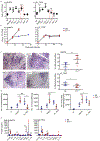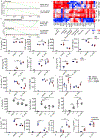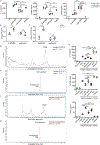Mycobacterium tuberculosis carrying a rifampicin drug resistance mutation reprograms macrophage metabolism through cell wall lipid changes
- PMID: 30224802
- PMCID: PMC6158078
- DOI: 10.1038/s41564-018-0245-0
Mycobacterium tuberculosis carrying a rifampicin drug resistance mutation reprograms macrophage metabolism through cell wall lipid changes
Erratum in
-
Publisher Correction: Mycobacterium tuberculosis carrying a rifampicin drug resistance mutation reprograms macrophage metabolism through cell wall lipid changes.Nat Microbiol. 2018 Nov;3(11):1327. doi: 10.1038/s41564-018-0281-9. Nat Microbiol. 2018. PMID: 30327492
Abstract
Tuberculosis is a significant global health threat, with one-third of the world's population infected with its causative agent Mycobacterium tuberculosis (Mtb). The emergence of multidrug-resistant (MDR) Mtb that is resistant to the frontline anti-tubercular drugs rifampicin and isoniazid forces treatment with toxic second-line drugs. Currently, ~4% of new and ~21% of previously treated tuberculosis cases are either rifampicin-drug-resistant or MDR Mtb infections1. The specific molecular host-pathogen interactions mediating the rapid worldwide spread of MDR Mtb strains remain poorly understood. W-Beijing Mtb strains are highly prevalent throughout the world and associated with increased drug resistance2. In the early 1990s, closely related MDR W-Beijing Mtb strains (W strains) were identified in large institutional outbreaks in New York City and caused high mortality rates3. The production of interleukin-1β (IL-1β) by macrophages coincides with the shift towards aerobic glycolysis, a metabolic process that mediates protection against drug-susceptible Mtb4. Here, using a collection of MDR W-Mtb strains, we demonstrate that the overexpression of Mtb cell wall lipids, phthiocerol dimycocerosates, bypasses the interleukin 1 receptor, type I (IL-1R1) signalling pathway, instead driving the induction of interferon-β (IFN-β) to reprogram macrophage metabolism. Importantly, Mtb carrying a drug resistance-conferring single nucleotide polymorphism in rpoB (H445Y)5 can modulate host macrophage metabolic reprogramming. These findings transform our mechanistic understanding of how emerging MDR Mtb strains may acquire drug resistance single nucleotide polymorphisms, thereby altering Mtb surface lipid expression and modulating host macrophage metabolic reprogramming.
Conflict of interest statement
Author Information
The authors declare no competing financial interests.
Figures




Comment in
-
More than merely drug resistance.Nat Microbiol. 2018 Oct;3(10):1078-1079. doi: 10.1038/s41564-018-0250-3. Nat Microbiol. 2018. PMID: 30254331 No abstract available.
References
-
- Global tuberculosis report 2015: WHO/HTM/TB/2015.22. Geneva: World Health Organization; (2015).
-
- Bifani PJ, Mathema B, Kurepina NE & Kreiswirth BN Global dissemination of the Mycobacterium tuberculosis W-Beijing family strains. Trends in Microbiology 10, 45–52, doi:S0966842X01022776 [pii] (2002). - PubMed
Publication types
MeSH terms
Substances
Grants and funding
- R01 AI123780/AI/NIAID NIH HHS/United States
- R01 AI111914/AI/NIAID NIH HHS/United States
- P41 GM103422/GM/NIGMS NIH HHS/United States
- R01 HL105427/HL/NHLBI NIH HHS/United States
- P30 CA091842/CA/NCI NIH HHS/United States
- UL1 TR000448/TR/NCATS NIH HHS/United States
- P60 DK020579/DK/NIDDK NIH HHS/United States
- P30 DK020579/DK/NIDDK NIH HHS/United States
- U19 AI091036/AI/NIAID NIH HHS/United States
- UL1 TR002345/TR/NCATS NIH HHS/United States
- P30 DK056341/DK/NIDDK NIH HHS/United States
- T32 HL007317/HL/NHLBI NIH HHS/United States
LinkOut - more resources
Full Text Sources
Other Literature Sources
Medical
Molecular Biology Databases

